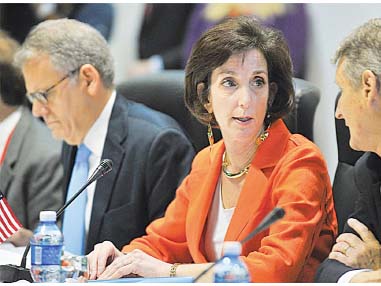
AFP, Havana :
Cuban officials sat down on Thursday with the highest-level US delegation to visit Havana in 35 years for landmark talks on reopening embassies and thawing long frozen ties.
US assistant secretary of state Roberta Jacobson, the most senior US official on the communist-ruled island since 1980, led the American delegation as the Cold War-era rivals opened a second day of meetings.
Cuba was represented by the director of the foreign ministry’s US affairs department, Josefina Vidal, at the capital’s Convention Centre.
The two sides claimed a good first day on Wednesday despite persistent disagreements over US migration policies, which Havana says encourages Cubans to flee to nearby Florida.
US President Barack Obama and Cuban leader Raul Castro surprised the world in December when they simultaneously announced plans to normalise relations following months of secret negotiations.
The raising of the US and Cuban flags in each other’s capitals would send powerful signals of the new era the two nations want to enter, though no timeline has been given for the reopening of embassies.
US Secretary of State John Kerry warned Wednesday that the two sides still have much to negotiate before they can normalise ties frozen since 1961.
“When it is timely, when it is appropriate, I’ll look forward to traveling to Cuba in order to formally open an embassy and begin to move forward,” Kerry said in Washington.
Cuban officials have also downplayed expectations of major breakthroughs this week, stressing that normalising ties will be a long and complex process.After Jacobson had a working dinner with Cuban counterparts on Wednesday night, the two sides will negotiate how to turn their “interests sections” into fully functioning embassies with ambassadors in Washington and Havana.
The US mission to Cuba, a concrete and glass building along the capital’s picturesque seawall, has been a symbol of the countries’ animosity since it opened in 1977. Across the main entrance, the Cuban government built a vast esplanade to hold anti-US rallies.In 2006, then president Fidel Castro ordered 138 flagpoles erected to block a giant display screen the mission was using to convey political messages.
Now, Washington wants Havana to reaccredit its diplomats; end travel restrictions for them within the island; ease shipments to the US mission; and lift a cap on US personnel.
“I don’t know if these things are going to be resolved in one meeting,” a US official said.
The Cuban delegation has voiced “deep concerns” over the situation of the interests section in Washington, saying the US embargo has left its consulate without banking services for almost a year.
Between February and May last year, the Cuban consulate was unable to issue passports because it could not find a bank to handle transactions.
Cuban diplomats also face travel restrictions in Washington.
Arturo Lopez-Levy, an international affairs professor at New York University, said the talks are important to build trust as they seek new relations in the coming years.
Cuban officials sat down on Thursday with the highest-level US delegation to visit Havana in 35 years for landmark talks on reopening embassies and thawing long frozen ties.
US assistant secretary of state Roberta Jacobson, the most senior US official on the communist-ruled island since 1980, led the American delegation as the Cold War-era rivals opened a second day of meetings.
Cuba was represented by the director of the foreign ministry’s US affairs department, Josefina Vidal, at the capital’s Convention Centre.
The two sides claimed a good first day on Wednesday despite persistent disagreements over US migration policies, which Havana says encourages Cubans to flee to nearby Florida.
US President Barack Obama and Cuban leader Raul Castro surprised the world in December when they simultaneously announced plans to normalise relations following months of secret negotiations.
The raising of the US and Cuban flags in each other’s capitals would send powerful signals of the new era the two nations want to enter, though no timeline has been given for the reopening of embassies.
US Secretary of State John Kerry warned Wednesday that the two sides still have much to negotiate before they can normalise ties frozen since 1961.
“When it is timely, when it is appropriate, I’ll look forward to traveling to Cuba in order to formally open an embassy and begin to move forward,” Kerry said in Washington.
Cuban officials have also downplayed expectations of major breakthroughs this week, stressing that normalising ties will be a long and complex process.After Jacobson had a working dinner with Cuban counterparts on Wednesday night, the two sides will negotiate how to turn their “interests sections” into fully functioning embassies with ambassadors in Washington and Havana.
The US mission to Cuba, a concrete and glass building along the capital’s picturesque seawall, has been a symbol of the countries’ animosity since it opened in 1977. Across the main entrance, the Cuban government built a vast esplanade to hold anti-US rallies.In 2006, then president Fidel Castro ordered 138 flagpoles erected to block a giant display screen the mission was using to convey political messages.
Now, Washington wants Havana to reaccredit its diplomats; end travel restrictions for them within the island; ease shipments to the US mission; and lift a cap on US personnel.
“I don’t know if these things are going to be resolved in one meeting,” a US official said.
The Cuban delegation has voiced “deep concerns” over the situation of the interests section in Washington, saying the US embargo has left its consulate without banking services for almost a year.
Between February and May last year, the Cuban consulate was unable to issue passports because it could not find a bank to handle transactions.
Cuban diplomats also face travel restrictions in Washington.
Arturo Lopez-Levy, an international affairs professor at New York University, said the talks are important to build trust as they seek new relations in the coming years.

